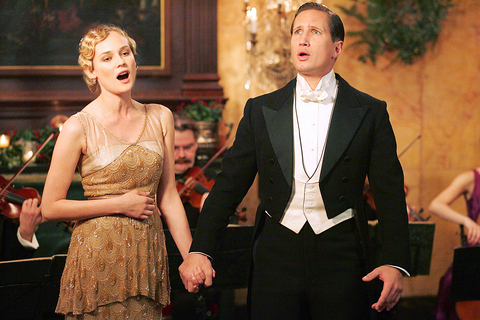Merry Christmas, a glossy French antiwar movie with melted snowflakes in its eyes, tells the true story of an improvised Christmas truce during the first year of World War I. The visually sweeping film, written and directed by Christian Carion, is the kind of feel-good, feel-sad movie with a message that invites you to bask in the glow of communal bonhomie, as enemy soldiers lay down their arms, stagger out of their trenches and sing carols together on a frigid Christmas Eve.
If the film's sentiments about the madness of war are impeccably high-minded, why then does Merry Christmas, an Oscar nominee for best foreign-language film, feel as squishy and vague as a handsome greeting card declaring peace on earth? Maybe it's because the kind of wars being fought in the 21st century involve religious, ideological and economic differences that go much deeper and feel more resistant to resolution than the European territorial disputes and power struggles that precipitated World War I.
Another reason is that the movie's cross-section of soldiers from France, Scotland and Germany are so scrupulously depicted as equal-opportunity peacemakers that they never come fully to life as individuals. All are well-spoken mouthpieces for cut-and-dried perspectives that vary somewhat, according to rank, background and war experience. As ferociously as they may fight, these soldiers are civilized good guys underneath their uniforms. When they go at one another, they're only following orders.

PHOTO COURTESY OF SWALLOW WING
The schematic story is prefaced with scenes of schoolchildren stiffly reciting nationalistic verses. We then meet Palmer (Gary Lewis), a gentle Anglican priest, who is silently aghast as two brothers, Jonathan (Steven Robertson) and William (Robin Laing), jump with joy at the prospect of leaving their dull Scottish village to go and fight. The saintly Palmer eventually follows them to the front where, soon enough, he presides over the burial of one of them.
We also drop in on a Berlin Opera performance featuring a celebrated Danish soprano, Anna Sorensen (Diane Kruger), that is interrupted by soldiers trooping onstage to announce that Germany has declared war. Anna's boyfriend, the noted German tenor Nikolaus Sprink (Benno Furmann), is swept into battle.
Proceeding directly to the front, Merry Christmas follows a French lieutenant, Audebert (Guillaume Canet), sick with fear, as he leads his men on a charge against the Germans, who are dug into a trench so close at hand that the two sides are within earshot of each other. The German side is led by Lieutenant Horstmayer (Daniel Bruhl), a thoughtful multilingual officer who, when Christmas cheer breaks out, confesses that he is Jewish, adding a carefully ironed historical crease to the story, given what we know will happen in Germany only a quarter-century later.
Anna, using her connections with the Kaiser, wangles permission to give a Christmas recital at the front with Nikolaus. When the recital takes place, the strains of Silent Night, heard by the French and Scots only a few hundred meters away, prompt the Scots to chime in with a bagpipe serenade. Heads pop up from the trenches, and when it looks safe, the soldiers pull themselves into view.
As the two sides mingle, champagne is poured, gift packets of goodies are shared, and photos of wives and girlfriends are exchanged and the treaty is extended into Christmas Day.

June 23 to June 29 After capturing the walled city of Hsinchu on June 22, 1895, the Japanese hoped to quickly push south and seize control of Taiwan’s entire west coast — but their advance was stalled for more than a month. Not only did local Hakka fighters continue to cause them headaches, resistance forces even attempted to retake the city three times. “We had planned to occupy Anping (Tainan) and Takao (Kaohsiung) as soon as possible, but ever since we took Hsinchu, nearby bandits proclaiming to be ‘righteous people’ (義民) have been destroying train tracks and electrical cables, and gathering in villages

Dr. Y. Tony Yang, Associate Dean of Health Policy and Population Science at George Washington University, argued last week in a piece for the Taipei Times about former president Ma Ying-jeou (馬英九) leading a student delegation to the People’s Republic of China (PRC) that, “The real question is not whether Ma’s visit helps or hurts Taiwan — it is why Taiwan lacks a sophisticated, multi-track approach to one of the most complex geopolitical relationships in the world” (“Ma’s Visit, DPP’s Blind Spot,” June 18, page 8). Yang contends that the Democratic Progressive Party (DPP) has a blind spot: “By treating any

This year will go down in the history books. Taiwan faces enormous turmoil and uncertainty in the coming months. Which political parties are in a good position to handle big changes? All of the main parties are beset with challenges. Taking stock, this column examined the Taiwan People’s Party (TPP) (“Huang Kuo-chang’s choking the life out of the TPP,” May 28, page 12), the Democratic Progressive Party (DPP) (“Challenges amid choppy waters for the DPP,” June 14, page 12) and the Chinese Nationalist Party (KMT) (“KMT struggles to seize opportunities as ‘interesting times’ loom,” June 20, page 11). Times like these can

Swooping low over the banks of a Nile River tributary, an aid flight run by retired American military officers released a stream of food-stuffed sacks over a town emptied by fighting in South Sudan, a country wracked by conflict. Last week’s air drop was the latest in a controversial development — private contracting firms led by former US intelligence officers and military veterans delivering aid to some of the world’s deadliest conflict zones, in operations organized with governments that are combatants in the conflicts. The moves are roiling the global aid community, which warns of a more militarized, politicized and profit-seeking trend